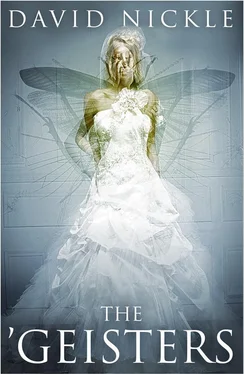Needless to say, when Rickhardt arrived, he’d demanded to see the ring Michael had bought her and Ann obliged: a two carat emerald-cut diamond, set in a smooth band of platinum. Yes, they were getting married.
“I think marriage is good,” he went on. “Good for Michael, good for you. I wish my wife could be here. She’d like you.”
Michael nodded.
“What’s her name?”
“Susan,” he said.
“Sorry she couldn’t come,” said Ann. “I’d love to meet her.”
Rickhardt made a small smile and sipped his wine. “You’re young,” he said. “How young?”
Another sip of wine, all around.
“Twenty-six,” she said.
He nodded. “Michael’s ten years older. Practically an old man. That doesn’t bother you?”
Michael met her eye and smiled a little, shook his head, and Ann said: “Horrifies me, actually,” and Rickhardt laughed.
“She’s not in it for the money,” said Michael, and stage-whispered: “Don’t worry. She’s loaded. ”
They didn’t really talk about money after that, although Rickhardt did ask her about her job at Krenk & Partners. He knew more than a little about them; Alex Krenk himself had joined forces with him in the 1990s, on an office development in Vancouver that had gotten some attention. Rickhardt had hired Krenk on various projects off and on since. They’d been asked to bid on designs for the restaurant and retail structures at his vineyard but had fallen short.
He told this story with clear expectation that Ann might jump in, but it was difficult. She was junior enough at the firm that she had no real knowledge about the Vancouver development; she’d helped out on some of the design for the vineyard, though, and she mentioned that. Rickhardt managed to say something nice about the bid, but facts were facts: the bid had fallen short. Ann attributed his words to a belated attempt at basic good manners.
There had been no mistaking when he’d finished his interview with Ann. He asked her a question about the type of care Philip was getting, but he clearly wasn’t interested. Halfway through her answer, he was refilling his glass.
She was in the middle of a sentence when he looked up, right past her, and asked Michael, “Hey, do you remember Villier?”
Michael frowned, snapped his fingers, and said, “John Villier? From Montreal? Of course! What’s he up to?” And so they launched into a long, context-free reminiscence about a trip the three of them had taken somewhere, some time ago, involving a seaplane and a great deal of liquor.
After Rickhardt left, they fought.
“He’s a jerk,” Ann said. They were standing on the narrow balcony where it overlooked the reclaimed industrial lands of the city’s east end. Across the street, patrons from a café built from an old auto body shop sat under glowing orange lanterns and wide umbrellas outside the open garage door, getting happily buzzed before another work week.
“That’s not fair,” said Michael, his voice taking a plaintive edge. “Ian’s just of a different generation.”
“Fair enough,” she said. “What’s your excuse?”
They’d both had some wine by then, and Ann’s tone was sharper than she’d intended. Two glasses ago, she might have stopped herself from pressing the matter.
“You left me out to dry,” she said. “Ian Rickhardt treated me like a piece of property, a new car you brought home. He came over to check it out. Check me out.”
Michael tucked his chin down, put both hands on the balcony rail, and pretended to study the seventh-day revellers in the café. “That’s not what was happening,” he said.
“Wasn’t it?”
“I told you he could be a little off-putting.”
“Yes. You did. And it was off-putting. So off-putting you abandoned me.”
Michael stepped back from the railing and held his hands in the air, a gesture of retreat. He stepped back through the doors and retreated further, to the kitchen. Ann looked away from him, down at the café. As she watched, one string of lanterns flickered, and went dark.
Good , she thought, and was immediately ashamed.
Now, at the vineyard, staring out at the stand of fiery golden maple trees, watching the van make its way up the drive, and wondering if there might be some more of that delicious Gewürzt inside, Ann winced at the memory. She swilled down the last dregs of the wine from her glass, and drew a deep breath of the smell of this place—woodsmoke and loam—and turned to go back inside Rickhardt’s winery. This was the place that Krenk & Partners didn’t design, and from the look of it, wouldn’t have if they’d been asked: all glass and oak around the tasting bar, faux-Bavarian beams demarking a first-storey ceiling below a dark loft above, railing hung with even-more-faux grapevine. Home Depot had won that bid, no question.
Rickhardt is a jerk. Also no question.
Ann swung around the tasting bar and pulled the half-empty bottle of Gewürzt out of the cooler. She poured herself half a glass.
He was a jerk. But so was she. She realized it when later that August Sunday, she’d come inside and started drying the dishes Michael was washing, and Michael had told her: “He wants to pay for the wedding. That’s why he wanted to meet you. He thinks of me as a son. I’m sorry you didn’t hit it off.”
Ann took a sip, and then another. She started to take a third, but stopped herself as the wine touched her lip and set the glass down on the bar. The place would fill up in just a few hours with the guests at her Ian-Rickhardt-Productions wedding. From the sound of things, it was already starting.
Outside, she could hear the van pulling up. For a moment, she considered finishing the wine. But she resisted.
There would be plenty of time for wine later.
iv
Ian Rickhardt’s list of guests was longest, at seventy-seven; Michael Voors’ list less so but still respectable at twenty-six. Ann LeSage invited just five people to her wedding and Ian and Michael both looked worried. But she insisted it wasn’t so sad as that. She loved four of them, and she was sure they loved her too, and that counted for a great deal.
Jeanie Yang had been Ann’s roommate for two years at the University of Toronto, and together they had explored the delicate art of old-school pencil-and-paper role-playing games, the subtle art of Anime, and the numbing craft of single malt scotch. She was working across the border in a lab outside Chicago, but caught up with Ann in G-chat as soon as she got the invite and said she’d drive out.
ANN: It’s a long drive.
JEANIE: OMFG its not. im a midwestrn grl now. everywhere goods 5 hours drive.
will lesley be there?
ANN: ummmm
JEANIE: :p
It was not awkward in the least, Jeanie insisted, that also attending would be Lesley Chalmers—another member of their little circle, with whom Jeanie had shared a bed for a semester. Lesley was in the architecture program with Ann, which was how she had met Jeanie, and it had been a terrible drama that year, Ann mediating their courtship, affair, and breakup.
Lesley was in Toronto, still; in school, still. She and her partner, Bec, would rent a car and make a weekend of it. Lesley was old-fashioned. She confirmed by telephone.
“Who’s going to be your maid of honour?” she asked.
“It’s awful, but I haven’t really picked one.”
“Wow. And the wedding’s—when?”
“October.”
“This October.”
“That’s right.”
“You know it’s already September, right?”
“I suppose I should pick one.”
“I suppose you should,” said Lesley. “It’s awfully last minute. It would have to be a very good friend.”
Ann stifled a laugh. Sometimes, the time since graduation seemed like a lifetime. Sometimes, like no time at all.
Читать дальше












